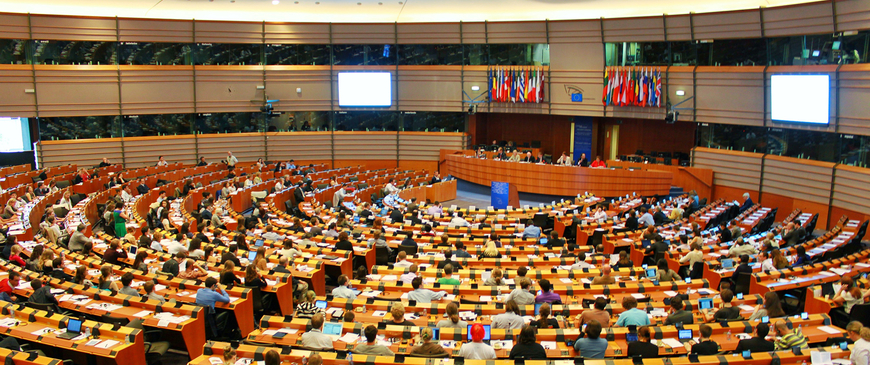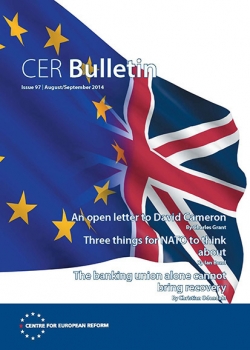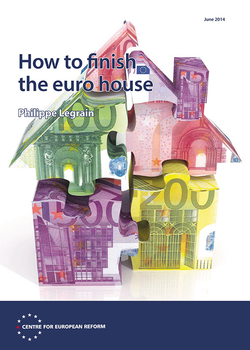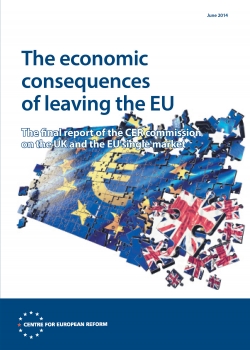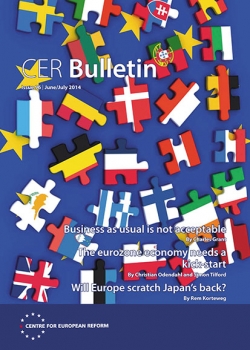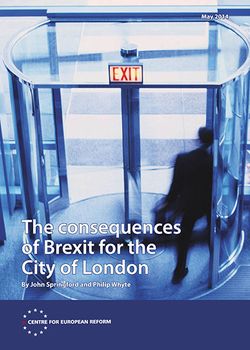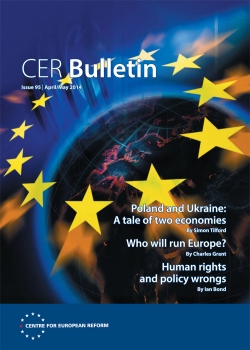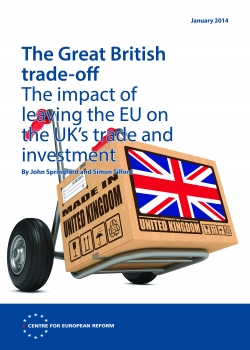Macroeconomics & the euro
EU enlargement
31 July 2014
A number of member-states are unenthusiastic about further EU enlargement, but has the EU grown as much as it is going to?
Issue 97 - 2014
29 July 2014
- An open letter to David Cameron, Charles Grant
- Three things for NATO to think about, Ian Bond
- The banking union alone cannot bring recovery, Christian Odendahl
The banking union alone cannot bring recovery
29 July 2014
The banking union is a work in progress but a significant step in the right direction. However, it will not be enough for a proper recovery.
The eurozone's real interest rate problem
08 July 2014
Aggressive fiscal and regulatory policies are needed to counteract the effects of divergent real interest rates in the eurozone – but this is not happening.
The eurozone is no place for poor countries
27 June 2014
The gap between the eurozone’s richer and poorer members is as wide as in 1999 and is growing. Poorer prospective members should take note.
How to finish the euro house
17 June 2014
Eurozone governance is politically unsustainable: its rules and institutions favour creditor over debtor countries. Eurozone policy-makers need to change direction before it is too late.
More investment, for Germany’s sake
13 June 2014
German investment is low while German borrowing costs are at record lows. Convincing the German government to invest will not be easy, for political reasons.
The economic consequences of leaving the EU
09 June 2014
A group of experts finds that, after leaving the EU, the UK would face an invidious choice: sign up to the single market’s rules, or suffer economic damage.In April 2016 an updated version of the report The economic consequences of leaving the EU: The final report of the CER commission on Brexit 2016 was published.
Issue 96 - 2014
06 June 2014
- Business as usual is not acceptable, Charles Grant
- The eurozone economy needs a kick-start, Christian Odendahl, Simon Tilford
- Will Europe scratch Japan's back?, Rem Korteweg
The eurozone economy needs a kick-start
06 June 2014
With just as many reasons for pessimism as for optimism in the eurozone, policy-makers need to further stimulate demand and pursue more targeted reforms.
Presidential candidates, European federalism and Tony Giddens
15 May 2014
The problem with ‘federalism’ is that most European citizens do not want it. This makes the federalist proposals in Tony Giddens’ new book unrealistic.
The consequences of Brexit for the City of London
08 May 2014
If Britain leaves the EU, the City of London will lose access to European markets – unless the UK aligns its financial rules with those of the EU.
Quantitative easing alone will not do the trick
28 April 2014
In the eurozone, quantitative easing by itself is unlikely to be effective. The European Central Bank needs to change the way it manages people’s expectations, too.
Issue 95 - 2014
31 March 2014
- Poland and Ukraine: A tale of two economies, Simon Tilford
- Who will run Europe?, Charles Grant
- Human rights and policy wrongs, Ian Bond
Poland and Ukraine: A tale of two economies
31 March 2014
The EU finally needs to fulfil its moral obligation to Ukraine: to treat it like any other sovereign country trying to escape Russia's grasp.
The eurozone's ruinous embrace of 'competitive devaluation'
10 March 2014
Instead of being criticised for pursuing competitive devaluations, eurozone countries that manage to devalue their real exchange rates are extolled as an example for others.
French federalists propose a Euro Community
03 March 2014
A group of French thinkers wants to establish a federal 'Euro Community'. Their scheme could harm the single market and make Britain's position in the EU uncomfortable.
What explains Europe's rejection of macroeconomic orthodoxy?
05 February 2014
European policy-makers' rejection of both Keynesianism and monetarism has cut economic growth, raised debt and increased the risk of deflation.
The Great British trade-off: The impact of leaving the EU on the UK's trade and investment
20 January 2014
Eurosceptics think Britain can leave the EU and still have access to its markets. But to do so, Britain will have to sign up to EU rules.
Why Germany’s trade surplus is bad for the eurozone
29 November 2013
In late October, the US singled out Germany as a threat to the global economy. The Treasury issued a report saying that Germany’s current account surplus – now around 7 per cent of GDP – imposes "a deflationary bias for the eurozone as well as for the world economy."

